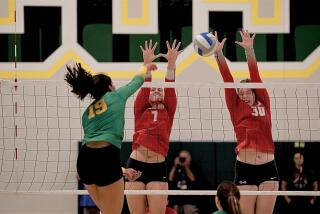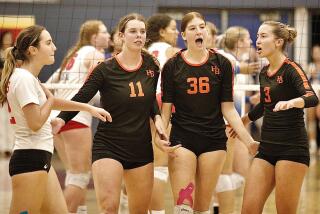Alix Klineman’s transition to beach volleyball has been everything she and April Ross could have hoped for
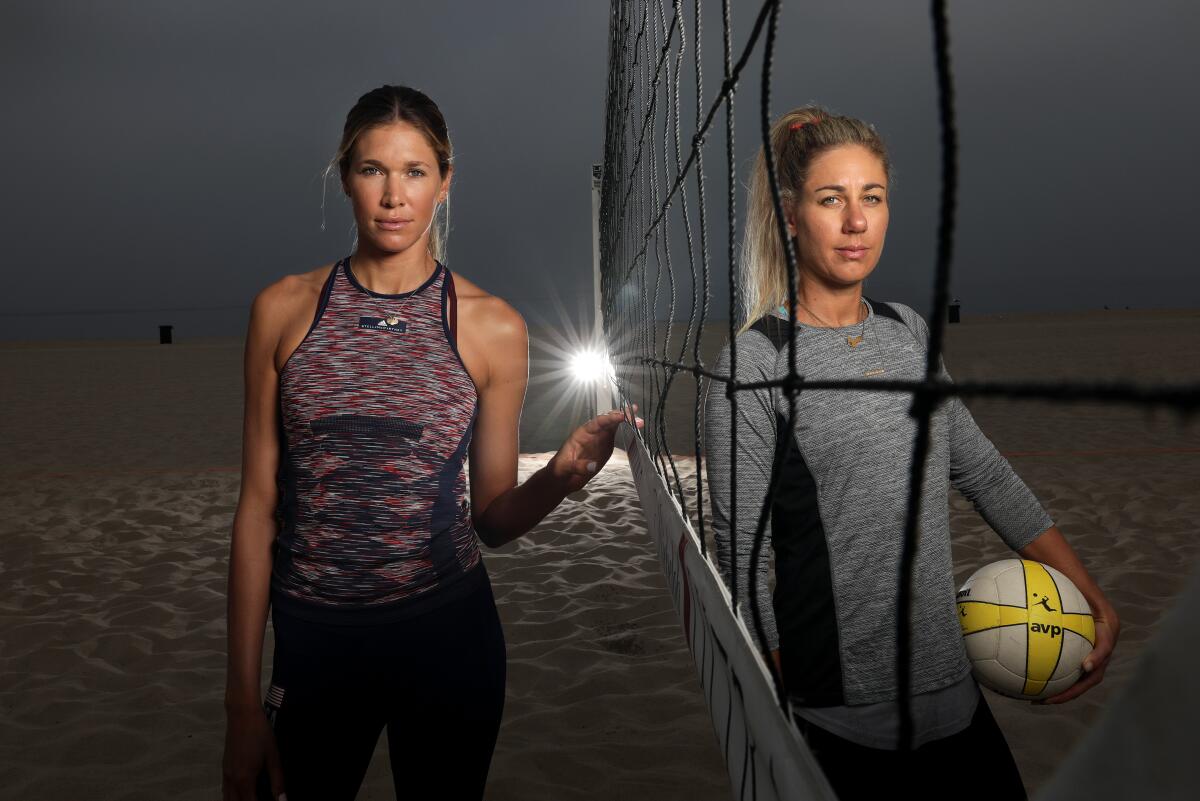
Tiny plumes of sand kicked up as Alix Klineman charged the net. With a powerful swing of her right arm, she hammered the volleyball across the court. Her spike was unstoppable, ricocheting off an opponent before slamming into the sand.
That was the winning point of a May tournament in Brazil, a result that propelled Klineman and partner April Ross — who will compete in this weekend’s AVP Tour Manhattan Beach Open — to the top of the U.S. Olympic qualifying standings.
“For a long time, it felt like this lofty thing,” Klineman said of the Olympics, raising her hand as she spoke. “Like, hopefully one day it will happen. Now we’re actually in the middle of it. We’re in an OK spot.”
Considering Klineman’s background, “OK” is an understatement.
Usually, a pro athlete’s career is a one-sport road — like a highway with no exits. The long-limbed, 6-foot-4 Manhattan Beach native is an exception.
After decorated collegiate and professional indoor volleyball careers, Klineman changed lanes and switched to the beach less than three years ago. Now, she and Ross are in strong position to reach the Games in Tokyo next summer.
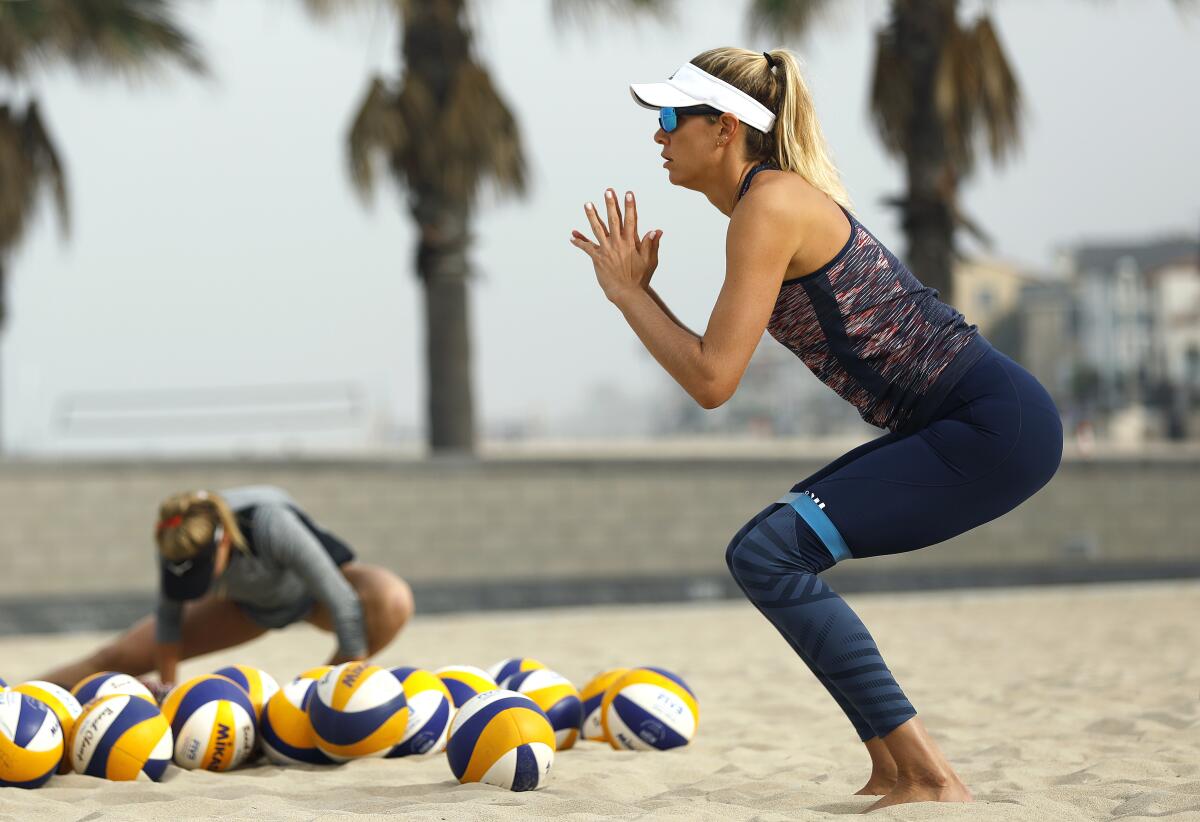
“I thought she would always be able to do it,” said Tyler Hildebrand, the director of coaching for the USA Volleyball Beach National Team Program. “But the fact that she’s gotten so good, so fast — I don’t think anyone would have predicted this.”
Indoor and beach volleyball are like distant cousins, utilizing similar core skills in different ways. Many pro beach players grew up playing inside before transitioning to sand after college. Klineman has tread a less traveled path, switching in the prime of her career after years spent exclusively on the hardwood.
“It’s so different on the beach,” said Ross, a two-time Olympian from Costa Mesa. “A lot of players try to switch … but just because they’re good indoors does not mean they are going to have a successful beach career.”
Klineman led Manhattan Beach Mira Costa High to three indoor volleyball state championships and was the national high school player of the year her senior year. At Stanford, she was a four-time All-American and again national player of the year. As a pro, she earned six-figure salaries playing in Italy and Brazil. Five times, she represented the U.S. in major international competitions.
“Indoor was what I was great at,” she said. “I was really trying to make the Olympic team on the indoor side.”
She said it took a “perfect storm” of problems to push her away.
Her Brazilian club practiced on a concrete floor that, covered by only thin layers of padding, wreaked havoc on her back and knees. During trips home to Southern California, she longingly watched pick-up games on the beach. The tipping point came in advance of the 2016 Olympics, when she was left off of the U.S. indoor roster.
“That made me evaluate everything,” Klineman said. “Yeah, I love volleyball, but I love it because I’m chasing the biggest goal. Once you take that away, it took away a little bit of my purpose. I’m too competitive to just be playing.”
On the beach, she saw a route to the Olympics decided exclusively by results.
“Nobody can stop me. Nobody can say, ‘Sorry, you didn’t make this roster,’” she said. “That really appealed to me.”
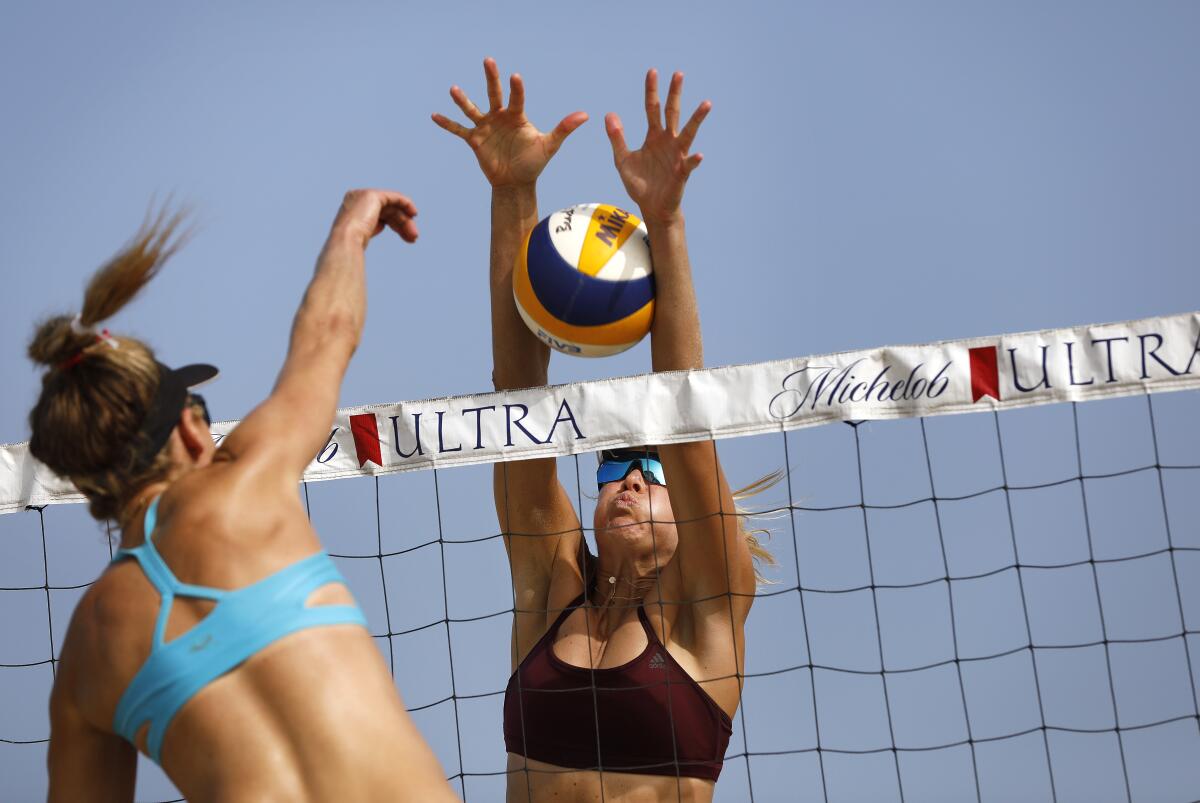
The transition is an ongoing process. During a recent practice at Hermosa Beach, Klineman peppered Hildebrand with questions: about her stance in the sand, her hand shape while hitting the ball, the timing of her jumps and how to anticipate the right spot to attack.
“I’ve been programmed to do things one way for 20 years,” Klineman said. “To try and change habits that are so embedded in me, that’s the hardest part.”
Indoor volleyball is structured. Players hone specific skill sets and have specialized roles. Schedules are set, the practices regimented, the paychecks stable.
Professional beach volleyball is free form, from the game tactics to non-stop international travel. Income is dictated by prize money that fluctuates. There is no club-provided safety net.
“I respect her for what she did,” said Klineman’s father, Mike, who was initially among those unsure whether Alix was making the right decision. “It wasn’t an easy choice. A lot of people probably would have said, ‘Well, maybe I won’t make the Olympics but I’ll be a top player and make good money and travel.’ There’s a lot of stuff she left behind.”
Some of Klineman’s indoor abilities easily adapted to the beach. For example, Hildebrand considers her the best server in the world. Other skills have required more work, but Klineman habitually devours tape of herself, which has helped her rewire her game.
“In the beginning, I was like, ‘I’m an indoor player who switched to the beach,’ ” Klineman said. “Now … I feel so immersed in what I’m doing now, I feel like I’ve shed that other part of my identity.”
Shore up a few more little things, and Hildebrand thinks Klineman could become one of the best all-around players in the world.
“She’s pretty well rounded,” echoed Ross. “I see her going through the cyclical thought processes of trying to solidify some of these skills. She’ll get it for a couple tournaments and then it’ll be like, ‘Why can’t I do it anymore?’ ”
Ross chose to partner with her after Klineman was chosen rookie of the year on the AVP tour in 2017. Last year, the duo won four AVP titles. This season, they’ve already medaled five times.
If they can maintain their position as one of the U.S.’s top two teams — countries are allowed a maximum of two teams in the Olympics — through next June, a trip to Tokyo will beckon.
“I have to pinch myself,” Klineman said. “It’s literally turned out as good as it can be.”
More to Read
Get our high school sports newsletter
Prep Rally is devoted to the SoCal high school sports experience, bringing you scores, stories and a behind-the-scenes look at what makes prep sports so popular.
You may occasionally receive promotional content from the Los Angeles Times.

